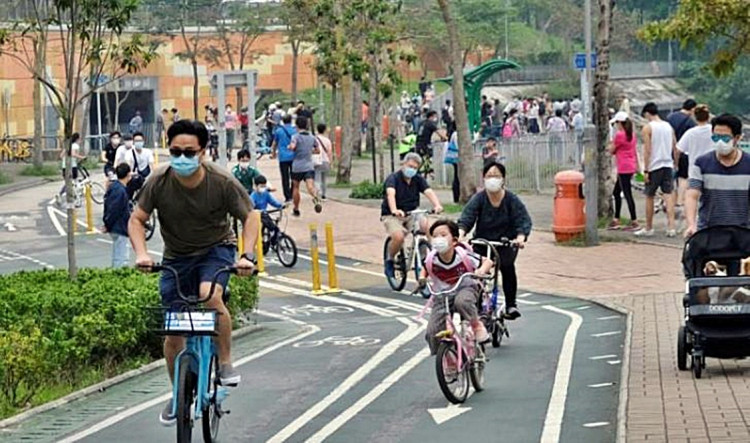Hong Kong Chief Executive Carrie Lam on Tuesday hailed as a success the territory's two-week mass COVID-19 testing scheme, in which 1.78 million residents were checked for the virus, as she hinted at a rollback of strict social distancing regulations.
Citing an infection rate of roughly just two cases per 100,000 people, Lam expressed confidence that Hong Kong could implement a gradual reopening of facilities across the city. Local medial also reported that bars, pools, restaurants and entertainment venues are set to resume more regular operations starting Friday in the wake of the mass testing results.
“The relatively low rate provides a very good epidemiological picture of what is happening,” Lam noted during a press conference, adding that the mass testing helped inform the decision by authorities to loosen social distancing restrictions.
“Our first objective was to identify asymptomatic infected people and the programme achieved that purpose. The second objective was to enable the government ... to better understand the infection situation in Hong Kong,” the city leader explained.
]Hong Kong authorities remain cautious, however. A total of 194 patients are currently hospitalized with COVID-19 in 19 hospitals across the city, among which 21 are in critical condition, eight are in serious condition and the remaining patients have stabilized, according to a Health Department press release on Monday.
“Although the epidemic situation in Hong Kong has subsided, there are still asymptomatic COVID-19 patients in the community,” a government spokesperson warned Tuesday. “Members of the public should stay vigilant and comply with the government’s anti-epidemic directives.”
Not Without Controversy
A 20,000-member healthcare union in Hong Kong came out against the testing program earlier this month, saying it was an inefficient way to handle the pandemic and was ultimately designed to curry favour with mainland authorities.
The Hong Kong government "will do whatever they can to please Beijing, even if it means placing politics above all else,” Hospital Authority Employees Alliance leader Winnie Yu noted at a September 1 press conference, encouraging people to boycott the tests.
While some healthcare workers have come out against the program, others have been forced to work 12-hour shifts to meet demand.
More than 6,000 medical staff, including 420 from mainland China, worked around the clock to operate the city’s COVID-19 testing sites. Some chose to wear diapers and forgo breaks altogether, according to recent interviews published by the South China Morning Post.
The government has yet to disclose the budget set aside for the mass testing scheme, although the price of tests at local private hospitals – which cost up to HK$3,500 ($450) per person – can be an approximate guide.
In the face of criticism over the time and expense invested in a program that has yielded only 32 positive cases, authorities are standing firm.
“From a public health perspective, the cost effectiveness should not be calculated by how many samples we have done or how many positive cases we have or how much we have spent,” Secretary for Food and Health Sophia Chan Siu-chee said earlier this month.
Since late January, when the virus first appeared in the region, the Hong Kong government prioritized high-risk groups, including travelers from abroad, the elderly and the immuno-compromised. Testing was later extended to specified groups including senior home workers, restaurant staff and transport sector workers.
“This type of universal community testing free of charge available to asymptomatic people [was previously] not a priority,” Lam said at an August 21 meeting with the press. “But given the severity of the current wave and the fact we have 30 to 40 percent of cases with unknown sources, the more we test the earlier we can find the outstanding cases.”
Bars Open, Beaches Stay Closed
Hong Kong is preparing to resume life – almost – as usual. Government-operated beaches will stay closed for the time being due to a higher risk of close contact, a source familiar with the situation told the South China Morning Post.
Meanwhile, the city’s central nightlife hub of Lan Kwai Fong (LKF) is preparing to keep bars open until midnight from this Friday onward as authorities loosen restrictions on restaurants and entertainment venues.
Allan Zeman, the founder of LKF Group, which owns swathes of properties in the nightlife district, said he had been reassured by government officials that a partial reopening was imminent.
“I was told if the number of COVID-19 infections continues to drop, potentially they will open [this] Friday,” Zeman said in an interview with the South China Morning Post over the weekend. “I told [the government] that if the bars are kept closed they will die and many people will lose their jobs.”
After a third wave of infections crashed over Hong Kong in mid-July, authorities closed pubs, bars, clubs and other premises that make the bulk of their revenue from selling alcohol.
Two weeks ago, restaurant dine-in hours were extended from 6 pm to 10 pm, and last weekend, restrictions limiting capacity to two diners per table were loosened to accommodate up to four people.
Pools in hotels, recreation centers and apartment buildings, which have been closed for months now, are also set to resume operation at half capacity. While swimming activities continue to be banned, gyms have been open for the last week with various restrictions.





